|
|
|
Sort Order |
|
|
|
Items / Page
|
|
|
|
|
|
|
| Srl | Item |
| 1 |
ID:
075896
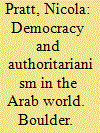

|
|
|
|
|
| Publication |
Boulder, Lynnne Rienner, 2007.
|
| Description |
ix, 235p.
|
| Standard Number |
1588264866
|
|
|
|
|
|
|
|
|
|
|
|
Copies: C:1/I:0,R:0,Q:0
Circulation
| Accession# | Call# | Current Location | Status | Policy | Location |
| 052109 | 320.9174927/PRA 052109 | Main | On Shelf | General | |
|
|
|
|
| 2 |
ID:
116830
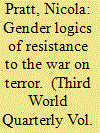

|
|
|
|
|
| Publication |
2012.
|
| Summary/Abstract |
This article asks, 'How are femininities constructed in resisting the "war on terror" and with what implications for women's agency and the conceptualisation of gender?' It examines the under-studied gender logics of non-violent resistance to the 'war on terror' by focusing on a series of conferences held in Cairo, between 2002 and 2008, uniting opposition to imperialism, Zionism, neoliberalism and dictatorship. Whereas much feminist scholarship conceptualises sex-gender difference within patriarchy as the major source of women's subordination, women speakers at the Cairo conferences erased patriarchy as a source of subordination and valorised sex-gender difference as a source of agency in resisting the 'war on terror'. Femininities were constructed against the dominant narratives and practices of the war on terror through the representation of national/religious or class differences. These 'resistance femininities' represent strategically essentialised identities that function to bridge differences and mobilise women against the 'war on terror'.
|
|
|
|
|
|
|
|
|
|
|
|
|
|
|
|
| 3 |
ID:
077306
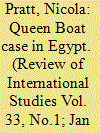

|
|
|
|
|
| Publication |
2007.
|
| Summary/Abstract |
The government's targeting of homosexuality in May 2001, following years of 'turning a blind eye' to Cairo's gay scene, is studied here in terms of the links between the sphere of interpersonal relations and notions of national security within international relations. The persecution of men for alleged same-sex relations not only filled newspaper columns and created a spectacle to divert people's attention away from the government's failings. More importantly, the event represented an opportunity for government officials, the media and other civil society activists - both within Egypt and abroad - to 'perform' a discourse of national security through which national sovereignty was (re)produced and political order was maintained. However, this national security threat was not only posed by the external threat of Western governments, international NGOs and other transnational actors concerned with respect for human rights within Egypt. More importantly, this threat was constructed as originating with those people failing to conform to the 'norm' of heterosexual relationships
|
|
|
|
|
|
|
|
|
|
|
|
|
|
|
|
| 4 |
ID:
126571
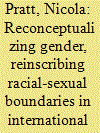

|
|
|
|
|
| Publication |
2013.
|
| Summary/Abstract |
The gendered boundaries of international security, historically identified by feminist scholarship, are being broken down since the passage of UN Security Council Resolution 1325, which calls on member states to mainstream a gender perspective into matters of conflict and peacebuilding. However, we should not read this as a positive step toward the transformation of the lives of women (and men) in conflict zones. Reading 1325 and subsequent resolutions through a postcolonial feminist lens reveals that this reconceptualization of gender occurs through a reinscription of racial-sexual boundaries, evocative of the political economy of imperialism. An examination of the discourses and practices of the "war on terror" exposes a similar configuration of gender, race, and sexuality. I argue that 1325 works in tandem with dominant security practices and discourses in the post-9/11 moment, normalizing the violence of counterterrorism and counterinsurgency measures. Understanding the significance of race and sexuality in the conceptualization of gender has implications for transnational feminist praxis and its ability to construct a counter-hegemonic project to transform the dominant structures of power that give rise to war, conflict, insecurity, and injustice.
|
|
|
|
|
|
|
|
|
|
|
|
|
|
|
|
| 5 |
ID:
165899
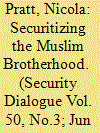

|
|
|
|
|
| Summary/Abstract |
Unprecedented levels of state violence against the Muslim Brotherhood, and the widespread acceptance of this violence by Egyptians following the July 2013 military coup, have been under-examined by scholars of both critical security studies and Middle East politics, reflecting implicit assumptions that state violence is unexceptional beyond Europe. This article explores how the deployment of such levels of violence was enabled by a securitization process in which the Egyptian military successfully appropriated popular opposition to Muslim Brotherhood rule, constructing the group as an existential threat to Egypt and justifying special measures against it. The article builds on existing critiques of the Eurocentrism of securitization theory, alongside the writings of Antonio Gramsci, to further refine its application to non-democratic contexts. In addition to revealing the exceptionalism of state violence against the Muslim Brotherhood and highlighting the important role of nominally non-state actors in constructing the Muslim Brotherhood as a threat to Egypt, the article also signals the role of securitization in re-establishing authoritarian rule in the wake of the 2011 uprising. Thus, we argue that securitization not only constitutes a break from ‘normal politics’ but may also be integral to the reconstitution of ‘normal politics’ following a period of transition.
|
|
|
|
|
|
|
|
|
|
|
|
|
|
|
|
|
|
|
|
|